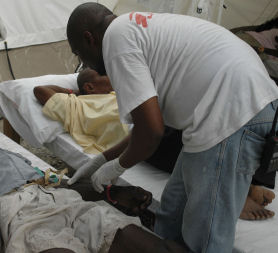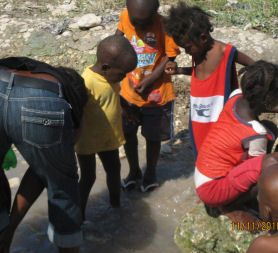Haiti cholera: hospitals running out of space
Hospitals are running out of space to treat patients as the cholera epidemic in Haiti spreads. A doctor tells Channel 4 News about fighting the disease on the front line in Port-au-Prince.

Cite Soleil is a slum in Port-au-Prince, Haiti with about a quarter million inhabitants. A few cholera cases have recently been confirmed here, and the Medecins Sans Frontieres (MSF) medical teams who were already working in the local hospital are now dealing with an increasing number of cholera patients. Dr Javid Abdelmoneim works in the MSF team in Cite Soleil and told Channel 4 News about his experience facing the outbreak.
About 10 days ago we started to see patients began arriving at the hospital with dehydration, vomiting and diarrhoea. We were already working in this facility so we set up a tent at the front of the hospital to keep patients isolated just in case it was cholera.
At first we managed to deal with those patients thanks to the MSF emergency room doctors and nurses and the stock of supplies we had at the hospital. At the time, we managed that relatively easily.
But now we are receiving more and more cases of what looks like cholera. Apart from a few cases, we don’t actually have the confirmed diagnosis here but all the symptoms and signs are there.
Each day the number of patients has increased dramatically: in the beginning 20 a day, than 40, 80, 130. In the last 24 hours we have had 170 new patients.
Experts predict Haiti cholera could hit 'hundreds of thousands' of people
To cope with the numbers, we have hired more staff – yesterday we hired 40 extra staff. Water and sanitation staff, cleaners, stretcher bearers, doctors and nurses.
At the moment, we have set up a triage centre: we stabilise the severe patients and refer them on to another better equipped MSF structure in Sarthe, which is about 20 minutes by car from here.
We refer the moderate patients who need observation and Oral Rehydration Salts (ORS) to other structures in the area. The remaining cases are the people under observation and are a bit better. We send them home with advice and their own supply or ORS and of course if they get worse again they can come back.
Initially we started with one tent and we had enough space to put eight beds there but very quickly we realised that we would need more space. Now we have 18 beds in two tents. We are full all the time and looking for other areas in the local area in which we might set up more tents.
But at this point in time we are stretched.
Lack of space
If the number of patients keep going up, it will become difficult. We have very little space. With the permission of the hospital director we have taken the car park and we set up the treatment tent there. That was the last available space that we could use that is isolated from the rest of the hospital to maintain an infection barrier.
The plan should we need to expand is… Our programme coordinator has been in talks with local groups to find structures, space in which we could expand and put up more cholera treatment areas. That’s the plan. We hope it won’t come to that.
If the number of patients keep going up, it will become difficult. We have very little space…we have taken the car park and we set up the treatment tent there. Dr Javid Abdelmoneim, in Haiti.
The local larger MSF structure, which is about 20 minutes by car from here is in the process of building a cholera treatment centre with 320 beds. Each day there an extra 40 beds are built. It will take a few more days and we will have to have a bigger referral system to try and transfer people as quickly as possible.
Bad infrastructure and living conditions
Because Cite Soleil is a quite unsafe slum, we don’t have many people coming in at night so the mornings are quite busy. We had a huge influx of patients this morning. In the first five or six hours there is a lot of work to do stabilising patients and arranging the transfers.
About a quarter million people live in Cite Soleil. There is no piped water or sewage system at all, and people use communal latrines. Water waste, rubbish and sewage all go in the same ditches along the side of the roads. So public health and sanitation is a little bit of a nightmare.

See more photographs from a camp in Haiti's Port-au-Prince
People live in cramped spaces so cholera could spread very quickly. We are working hard on prevention to avoid that. Last Sunday, we hired 34 new public health and health promotion workers, all from the local area. They had training and seminars and as of Monday they began sending out messages on prevention – how to wash your hands, how to disinfect, how cholera is spread.
They also teach people what to do if they get sick – go to a treatment centre as quickly as possible before the disease gets worse.
The hospital the MSF teams works in is the only health structure in the area and a lot of people will be relying on us and on Sarthe.
Normal services in the hospital
Despite the increased workload due to cholera activities, other services in the hospital have changed as little as possible. We are taking turns running the cholera treatment services while the rest of the team continues focusing on the emergency room, maternity care, the intensive care unit and our surgical patients. All the hospital departments are running at full capacity as before.
We try to keep disruption to the main part of the hospital to an absolute minimum and I think we have done a good job at that.
Initially we were managing everything okay with the original hospital team, although it was a bit of a strain. Gradually, and particularly since Saturday afternoon and after Hurricane Tomas, the emergency pool (additional emergency staff) are taking over and they will take full control of the cholera treatment so that we can continue running the hospital’s main services to the best extent possible.